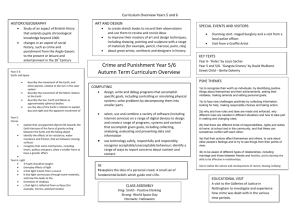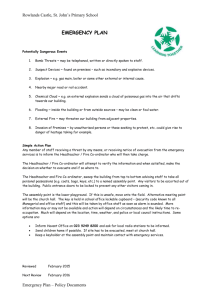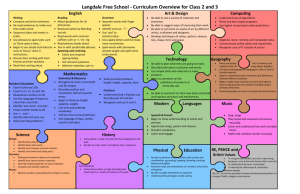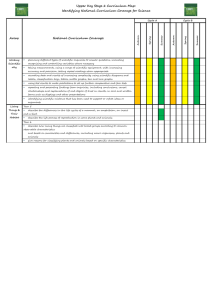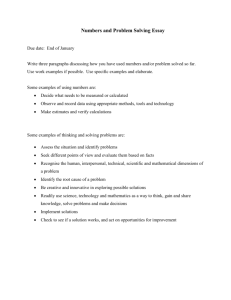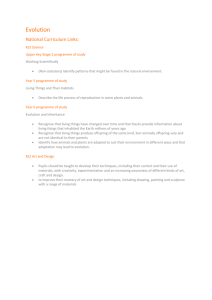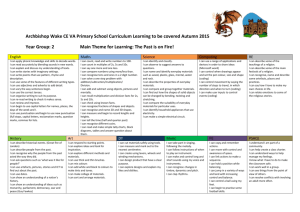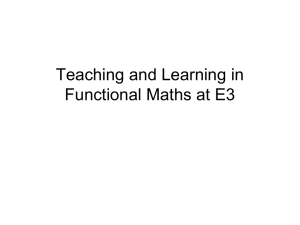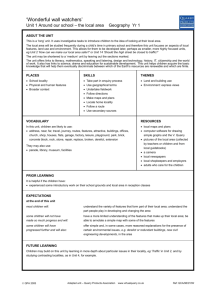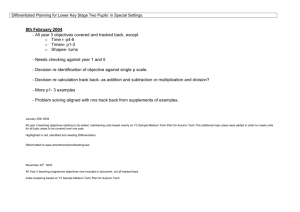ST MARY`S SCHOOL POLICY STATEMENT FOR EARLY YEARS (N
advertisement
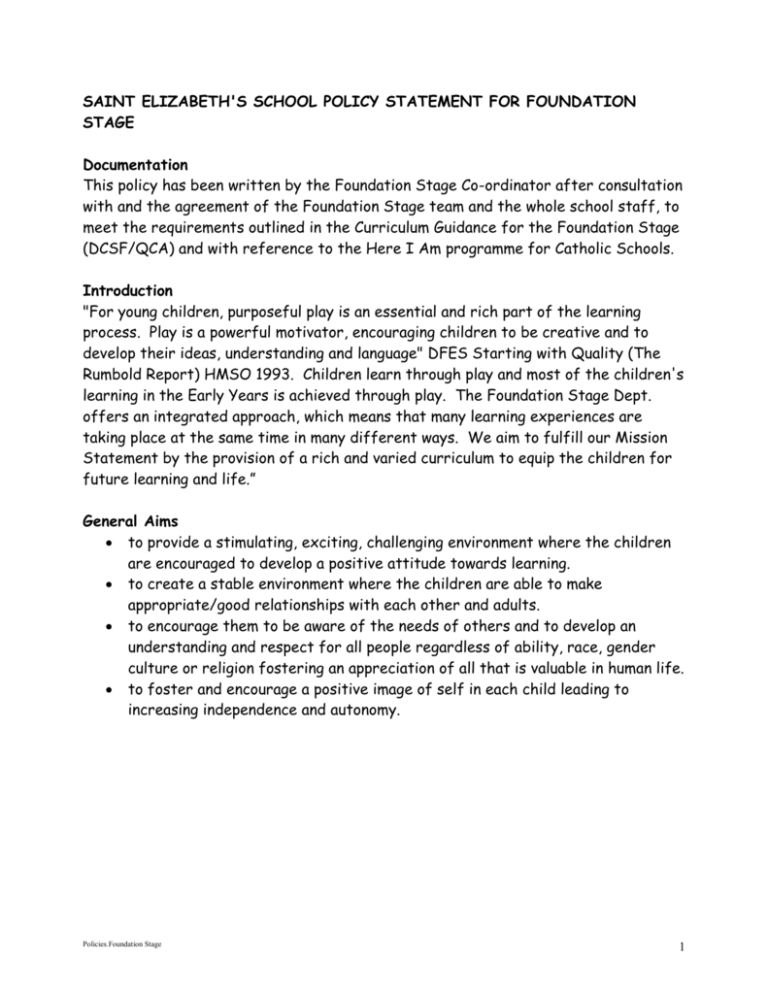
SAINT ELIZABETH'S SCHOOL POLICY STATEMENT FOR FOUNDATION STAGE Documentation This policy has been written by the Foundation Stage Co-ordinator after consultation with and the agreement of the Foundation Stage team and the whole school staff, to meet the requirements outlined in the Curriculum Guidance for the Foundation Stage (DCSF/QCA) and with reference to the Here I Am programme for Catholic Schools. Introduction "For young children, purposeful play is an essential and rich part of the learning process. Play is a powerful motivator, encouraging children to be creative and to develop their ideas, understanding and language" DFES Starting with Quality (The Rumbold Report) HMSO 1993. Children learn through play and most of the children's learning in the Early Years is achieved through play. The Foundation Stage Dept. offers an integrated approach, which means that many learning experiences are taking place at the same time in many different ways. We aim to fulfill our Mission Statement by the provision of a rich and varied curriculum to equip the children for future learning and life.” General Aims to provide a stimulating, exciting, challenging environment where the children are encouraged to develop a positive attitude towards learning. to create a stable environment where the children are able to make appropriate/good relationships with each other and adults. to encourage them to be aware of the needs of others and to develop an understanding and respect for all people regardless of ability, race, gender culture or religion fostering an appreciation of all that is valuable in human life. to foster and encourage a positive image of self in each child leading to increasing independence and autonomy. Policies.Foundation Stage 1 to help each child reach his/her full potential in all areas of development and learning: - personal, emotional and social, religious and spiritual, communication, language and literacy, mathematical development, knowledge and understanding of the world, physical and creative. to encourage and develop a sense of partnership between home and school. Objectives Personal, Social and Emotional Development to develop independence and confidence to develop skills to enable then to relate to children and adults in a variety of situations to play purposefully alone and cooperatively with a group to develop lively inquiring minds able to select an activity and pursue it to a satisfactory conclusion. Religious/Spiritual Development to to to to to to be aware of the needs of others; sharing and taking turns develop an understanding of what is right and what is wrong develop a respect for all people as equals respect all living things and care for environment share in relevant cultural and religious events experience a sense of joy and wonder in the world. Objectives Communication, Language and Literacy Speaking and Listening to provide opportunities for children to communicate thoughts and feelings to develop and encourage the ability to listen attentively to encourage the children to develop their language skills and to use language for a variety of purpose Policies.Foundation Stage 2 Reading to encourage the children to use and enjoy books and stories to understand that words and pictures convey ideas and in English print is read from Left to Right, Top to Bottom (being aware of children for which English is an additional language to begin to understand/recognise familiar words/key words to recognise letters by shape and sound Writing to develop skills with mark making equipment to write their own name and make representational drawings to begin to show awareness of a wider vocabulary and begin to write simple words /phrases Mathematical Development to encourage use of mathematical language e.g. circle, in front of, bigger than, to describe shape position, size and quantity to begin to use mathematical understanding to solve problems to be familiar with number rhymes and counting games etc to develop skills of observation, comparison and discrimination, recognizing shapes, colours etc to recognise and use numbers to 10 and beyond to begin to show awareness of number operations - addition and subtraction. Objectives Knowledge and Understanding of the World Science to encourage the children to explore, experiment, investigate and recognise living things, objects and happenings in the natural and man-made world to encourage the children to look at similarities/differences, pattern and change in the environment Policies.Foundation Stage 3 to discuss, describe, question and record their findings about why things happen and how things work. Design/Technology to experience using a wide variety of tools/toys & equipment, to develop skills such as cutting, joining, folding and building to use their developing skills appropriately to plan and build using a variety of resources. Geography to develop an awareness of where they live and where other people live to begin to be aware of different localities/environment and their different uses, and discuss likes/dislikes to begin to understand the need to take care of the environment. History to encourage the children to be aware of events and happenings in their lives to celebrate special events - birthdays, baptism etc to develop a sense of time - days of the week, months of the year etc I.C.T to encourage the children to find out and identify uses of technology, videos, tape recorders calculators and computers and use I.C.T to support their learning in all areas. Physical Development to develop control, balance, co-ordination and confidence using a variety of small and large equipment to travel around, under, over and through balancing and climbing equipment to develop an awareness of themselves, of space and others to recognise the importance of being healthy and that change happen when they are active Policies.Foundation Stage 4 to encourage the ability to manipulate small toys and tools with increasing control. Creative Development to explore, investigate, use a wide variety of sounds, colours, textures, shapes and forms in two or three dimensions to use a wide variety of tools, materials & instruments to express ideas and communicate feelings to encourage the children to express and communicate their ideas, thoughts and feelings through art, music, dance, stories and imaginative play to show an increasing ability to use their imagination, to listen, observe and communicate. to respond in a variety of ways to what they see, hear, smell, touch and feel Foundation Stage Statutory/Non Statutory Guidelines In the curriculum Guidance for the Foundation Stage (DCSF/QCA) and with reference to the "Here I am" programme for Catholic Schools. Planning for Continuity and Progression A wide variety of activities is carefully planned so that all areas of development and learning are catered for. At St Mary's the Foundation Stage. curriculum will be delivered using a 2 year topic cycle regularly reviewed to ensure progression into the National Curriculum/QCA topics in KS1 /KS2 A broad, balanced, differentiated range of activities and resources (indoor and outdoor) are provided and repeated at regular intervals giving opportunities for each child to develop appropriate skills, concepts attitudes and knowledge. Staff play an important and vital part within the Foundation Stage environment, they are constantly encouraging the children to develop their full potential in all areas of learning. The fundamental role of the parent/carer as the primary educator is acknowledged and a partnership is encouraged to support the child's learning and development. Special Needs We accept the uniqueness of all children and endeavour to give equal value to each one. We recognise the need to differentiate the curriculum so that all children Policies.Foundation Stage 5 experience success and develop to their full potential. (For specific details see Code of Practice/SEN Policy Equal Opportunities We aim to provide a broad, balanced, child-centred curriculum for all children regardless of ability, race, religion, culture or gender. Health and Safety All activities are carefully planned and carried out to comply with current guidelines. Resources To be located within the classroom store cupboard, outdoor storage area, Art cupboard and area between Iona and Durham classes. Assessment and Record Keeping Assessment will aim to monitor and record the progress of each child so that appropriate learning experiences can be provided. Samples and photographs will be collated where appropriate. Baseline Assessment will be undertaken as per LEA Guidelines and results used to inform planning. Parents will be informed regularly of their child’s progress /areas for development. Role of Headteacher, SMT and Co-ordinator The Headteacher and SMT monitor the Foundation Stage curriculum through the planning documents submitted each half term/term. The Co-ordinator co-ordinates the writing of schemes of work, half termly plans and weekly plans. She updates and co-ordinates resources and liaises with all team members. Date of Policy December 2007 Date of Review December 2009 Policies.Foundation Stage 6

